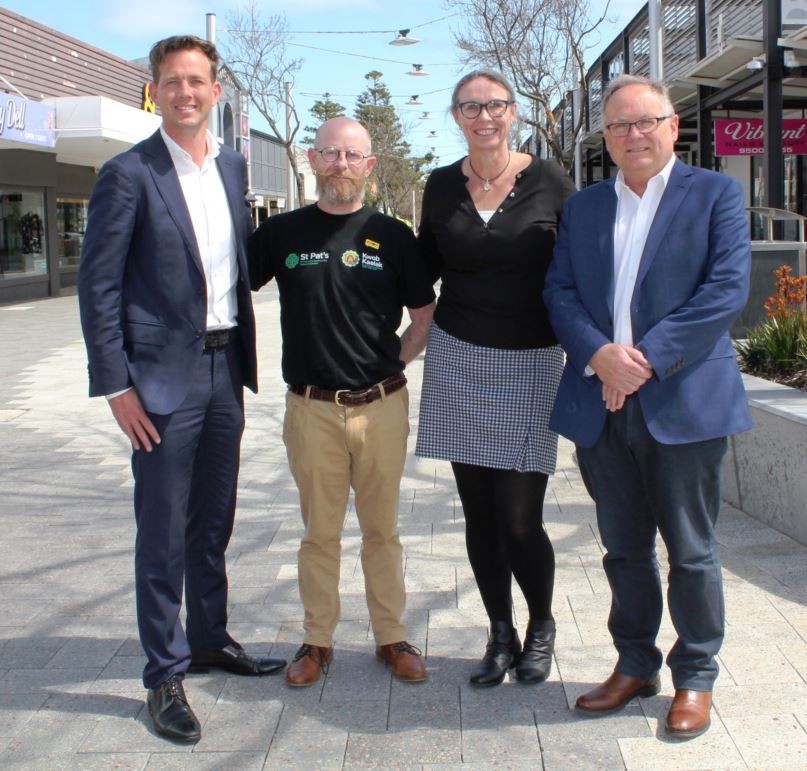
Mayor Rhys Williams, Jason Hyde from St Pat's, Member for Dawesville Lisa Munday and Member for Mandurah David Templeman celebrate the first year of Mandurah's Assertive Outreach program
Mayor Rhys Williams has described Mandurah’s Assertive Outreach program as a potential ‘game changer’, with more than 30 people experiencing homelessness in Mandurah finding permanent homes in the first 12 months of the two-year trial program.
The City of Mandurah and St Patrick’s Community Support Centre formed a partnership in July 2021 to deliver the two-year Assertive Outreach trial. The City received $350,000 in funding from the State Government and WA Police to run the trial.
Mandurah Mayor Rhys Williams said the united effort and partnership across local and state governments with service providers was making a real and tangible difference to people experiencing hardship.
“The Assertive Outreach program, in conjunction with Government’s Housing First initiative, is proving to be a critical piece in our approach to tackling the issue of homelessness in our community,” Mayor Williams said. “Since the trial commenced in September 2021, outreach workers from St Pat’s have helped many individuals and families either sleeping rough or experiencing homelessness in Mandurah, with a tailored one-on-one approach – ensuring their specific needs are identified and given the help they need to get back on their feet.
“The City pursued this trial after receiving feedback from local businesses about challenges they were facing due to disruptive behaviour in the City Centre, and also from local service providers who had identified a significant gap in the provision of support services to those people who would not or could not proactively seek the help they needed.”
Mayor Williams said there were currently about 112 people experiencing homelessness locally, of which 65 were reportedly sleeping rough.
“The State Government in partnership with the City and local service providers are progressing a number of significant initiatives to address homelessness in Mandurah, including Common Ground. The Assertive Outreach service is proving to be the missing piece and we anticipate that the State Government will seriously consider securing this as a permanent service in Mandurah beyond the current trial period,” he said.
Since the program started in September 2021, outreach workers have made over 470 contacts with 65 people experiencing homelessness in Mandurah and are currently engaging with around 104 people. Together with the Housing First program also overseen by St Pat’s, 36 local people have been supported to find permanent housing since July 2021. Many others have been connected with a range of support services including housing, counselling, emergency accommodation and food relief, with more than 430 referrals made to service providers up until August this year.
Mandurah MLA David Templeman said “The Assertive Outreach service works collectively with the State Government’s Housing First model, assisting people with secure and emergency accommodation, along with the additional support services that provide further stability to people’s lives”.
“I am pleased the McGowan Government, City of Mandurah and St Pat’s continue to come together to provide such valuable services for the people of Mandurah,” Mr Templeman said.
In collaboration with local service providers, the St Pat’s Rockingham/Mandurah Housing First team has advocated for and supported at least five families (including eight children) into permanent accommodation, as well individuals including seniors.
“St Pat’s are very proud of the work our Kwob Kaalak team has done to support people doing it tough in Mandurah,” St Pat’s Chief Executive Officer Michael Piu said.
“Despite the city’s very tight rental market and a social housing shortage, they have successfully supported highly vulnerable people into housing and hundreds more have been connected with vital services to help maintain safe, appropriate accommodation. The team has proven that by working together, local governments and service providers can create better outcomes for people and contribute to building communities where everyone feels welcomed and supported, no matter what personal or systemic challenges they may be confronting.”


